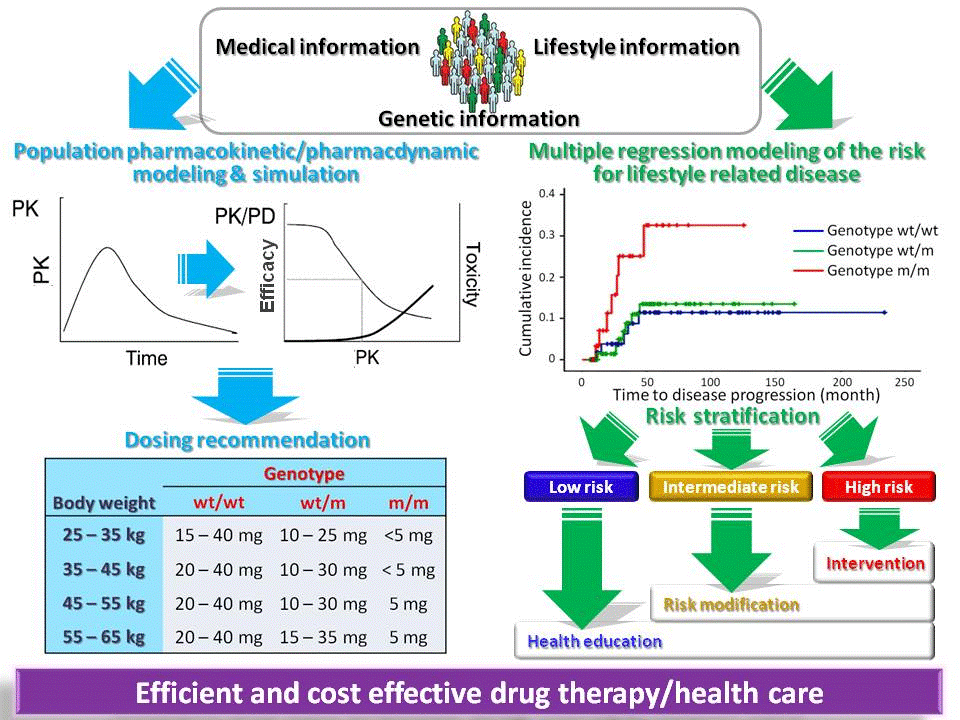スタッフ
| 教授 | 猿渡 淳二 junsaru(アットマーク)gpo.kumamoto-u.ac.jp |
|---|---|
| 准教授 | 鬼木 健太郎 oniken(アットマーク)kumamoto-u.ac.jp |
研究テーマ
【研究プロジェクト名および概要】
私達は、個別化医療の推進を目的として、薬物代謝酵素等の遺伝子多型や他の個体要因(性別、喫煙歴、飲酒歴、併用薬等)が、薬物動態や薬力学、疾患感受性、病態に及ぼす影響を検討しています。
具体的には、1.我々はモデリング&シミュレーションの手法を用いて、精神神経疾患 治療薬の個別化投与設計法の開発を行っている。なかでも、クロバザムやバルプロ酸といったいくつかの抗てんかん薬では、薬物代謝酵素 cytochrome P450等の遺伝子型を組み込んだ母集団薬物動態―薬力学モデルを構築し、遺伝子型を含む患者情報に応じた推奨投与量を提案した。 また、2.生活習慣病予防のための有用性の高い遺伝情報を、①疾患の発症や進展を有意に修飾する科学的根拠があり、②発症早期から 病態に関与して早期予防に役立ち、③変異アレル頻度が高く、④生活習慣(喫煙など)と相互作用を示す、という4条件を重視して検討し、 糖尿病・高血圧・脂肪肝等の発症リスクを層別化するための複数の候補遺伝子を多変量解析により見出し、生活習慣病の発症と進行予防のための生活改善に役立つ遺伝子診断パネル作成を目標に研究を進めている。その他、3.作用発現の性差については様々な報告があるものの、その詳細は不明であることから、我々は、熊本県薬剤師会Drug Event Monitoring (DEM)事業データの提供を受けて、DPP-4阻害薬等の各種薬剤使用中に起きた副作用における性差の検討を行っている。さらに、4.生薬・漢方薬の薬物相互作用に関する安全性試験や、5.新しいフリーラジカル測定法の開発と応用を目指した検討も行っている。
Research themes
1) we attempt to identify the determinants of pharmacokinetics and pharmacodynamics of the neuro-psychotropic drugs using a modeling & simulation approach. To date, we developed the population pharmacokinetic/pharmacodynamic models of several commonly used antiepileptic drugs, such as clobazam and valproic acid, incorporating genetic polymorphisms of cytochrome P450 enzymes, and then we proposed the recommended doses. 2) Opportunities exist at every stage of disease initiation and progression for the development of a health plan addressing lifestyle, risk modification, and disease management. We therefore attempt to identify the common susceptibility genes, which modify the disease initiation and progression in concert with the lifestyle, using multiple regression models, and to develop a personalized health plan based on the risk stratification by the combination of several susceptibility genotypes. Additionally, 3) we attempt to detect the genetic and non-genetic risk factors, particularly female while considering sex differences, on the adverse drug reactions based on the medical records. Other projects include 4) Safety assessment: evaluation of the potential interaction between Kampo medicine and co-administered drugs.


